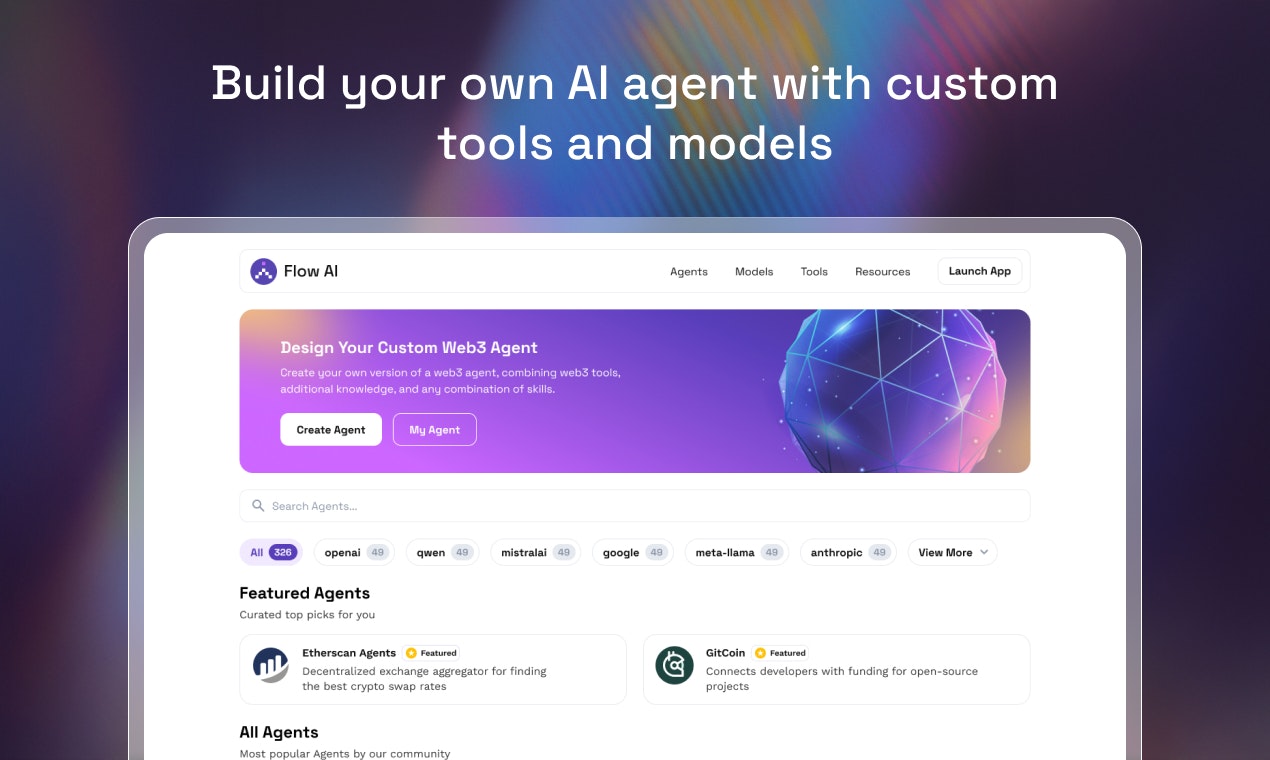Table of Contents
Overview
In the rapidly evolving artificial intelligence landscape, AI agents are transitioning from theoretical concepts to practical applications. FlowAI is pioneering the next phase of the creator economy by developing a comprehensive AI Agent Marketplace where creative professionals can build sophisticated agents, seamlessly integrate them into operational workflows, and monetize their innovations. This platform envisions a future where AI agents serve as powerful, accessible tools for innovation and enhanced productivity across diverse industries.
Key Features
Exploring FlowAI’s compelling capabilities reveals core features designed to empower creators and teams in the AI agent ecosystem:
- Multi-agent team collaboration with marketplace-driven data exchange: FlowAI enables users to construct collaborative AI teams where agents interact dynamically, share critical data, and exchange valuable insights within a thriving marketplace environment.
- Web3-native architecture with real-time data connectivity through Chakra partnership: The platform leverages a robust Web3 foundation emphasizing decentralized data connectivity. Through its strategic partnership with Chakra established in April 2025, FlowAI ensures access to real-time, verifiable datasets essential for intelligent agent operations.
- Scalable integration solutions for individual creators and enterprise teams: Whether operating as an independent developer or within a large enterprise organization, FlowAI provides adaptable solutions and comprehensive integrations to accommodate diverse operational requirements and scaling needs.
How It Works
Understanding FlowAI’s operational mechanics reveals a streamlined process for developing and deploying effective AI agents. Users can create and publish custom AI agents directly to the marketplace, making them discoverable and accessible to the broader community. These agents leverage FlowAI’s robust data infrastructure to connect with real-time datasets provided through the Chakra partnership. The platform facilitates sophisticated orchestration of agent tools and data for targeted missions, including complex DeFi analysis and automated trading operations, enabling powerful, purpose-built applications.
Use Cases
FlowAI’s versatility unlocks numerous powerful applications, particularly within the Web3 ecosystem, offering innovative solutions across various domains:
- On-chain data analysis and automated DeFi operations: Users can deploy specialized AI agents capable of analyzing blockchain data, providing comprehensive insights into decentralized finance markets, and automating sophisticated financial operations with precision and efficiency.
- Community intelligence, collaborative data sharing, and operational automation: FlowAI enhances community engagement through intelligent data sharing capabilities, enabling AI agents to extract meaningful insights and automate complex operational tasks within diverse Web3 ecosystems and decentralized communities.
Pros \& Cons
FlowAI presents unique advantages alongside important considerations for potential users.
Advantages
- Direct creator monetization through integrated marketplace: FlowAI provides clear pathways for creators to generate revenue from their AI agents through its comprehensive marketplace platform, fostering an emerging economy centered around intelligent automation tools.
- Comprehensive Web3 data integration and security: Deep integration with Web3 principles and decentralized data infrastructure ensures secure, transparent, and verifiable data handling, appealing strongly to the decentralized technology community.
Disadvantages
- Specialized Web3 focus may restrict broader applications: While Web3 specialization represents a significant strength, it potentially limits appeal for users seeking general-purpose AI agent solutions outside decentralized ecosystems.
- Limited pricing transparency: The absence of publicly available pricing details may present barriers for potential users seeking to evaluate platform cost-effectiveness and budget accordingly.
How Does It Compare?
In the competitive AI agent marketplace landscape, FlowAI carves a distinctive niche through its Web3 specialization. Current market leaders include established platforms like AutoGen Studio for multi-agent orchestration, Zapier for workflow automation with AI capabilities, CrewAI for collaborative agent teams, and enterprise solutions like Microsoft Copilot Studio. In the Web3 space, FlowAI competes directly with Autonolas for decentralized agent coordination, MyShell for agent creation and deployment, and Virtuals Protocol for agent tokenization.
FlowAI differentiates itself through its strategic open-data partnership with Chakra, providing unique access to real-time, verified datasets essential for Web3 operations. This partnership enables sophisticated on-chain analysis and automated DeFi operations that many competitors cannot match. Additionally, FlowAI’s focus on creator monetization through marketplace dynamics positions it as a platform for the emerging AI agent economy, distinguishing it from purely technical or enterprise-focused solutions.
Final Thoughts
FlowAI represents a compelling vision for the future of AI agents, particularly for professionals and organizations invested in the Web3 ecosystem. By empowering creators to build, monetize, and deploy AI agents within a decentralized framework, FlowAI is establishing groundwork for a new era of intelligent automation. While its Web3 specialization and current lack of transparent pricing may be considerations for some users, its innovative approach to agent marketplaces, real-time data integration through the Chakra partnership, and focus on creator monetization make it a noteworthy platform for anyone looking to leverage AI capabilities within the decentralized technology space.
